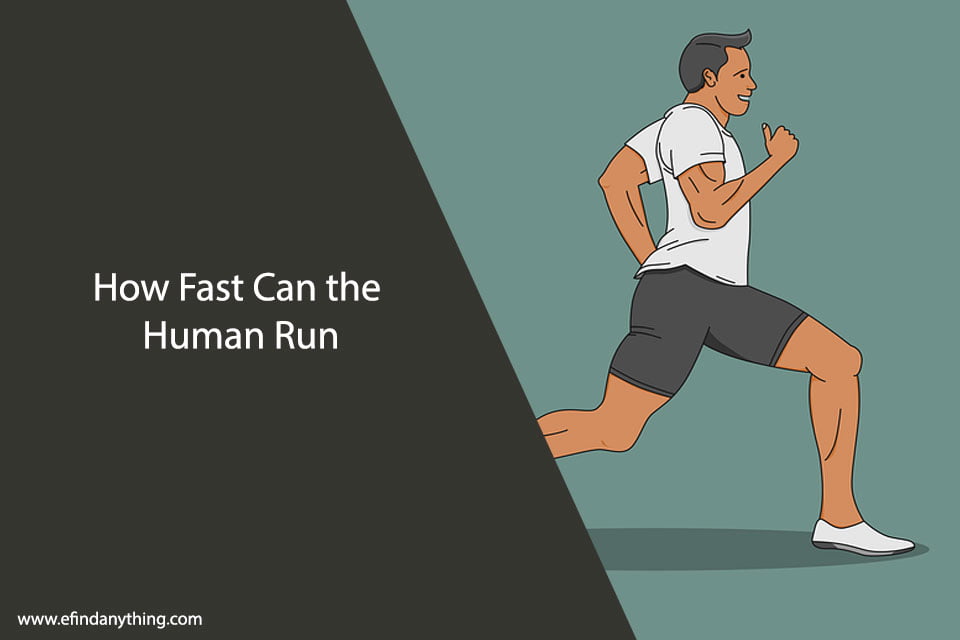Humans have been running for thousands of years, and the question of how fast we can run has been a topic of interest for just as long. While the answer to this question is not a simple one, we can say with confidence that humans are capable of running at impressive speeds.
The fastest recorded human running speed is 28 miles per hour (45 kilometers per hour), achieved by Usain Bolt during the 2009 World Championships in Berlin. However, this is an exceptional case, and the average human running speed is much lower. In fact, most people can only run at speeds between 8 and 15 miles per hour (13 to 24 kilometers per hour).

Table of Contents
The Human Body and Speed
When it comes to speed, the human body has some impressive capabilities. Our bodies are designed to move efficiently, and we have developed various physical adaptations that allow us to run faster than most other animals on the planet.
One of the key factors that contribute to our speed is our ability to generate power. Our leg muscles are some of the strongest in the body, and they are responsible for propelling us forward when we run. Additionally, our bodies are built to be aerodynamic, with a streamlined shape that reduces air resistance and allows us to move more quickly through the air.
Another important factor in our speed is our stride length. Humans have a relatively long stride compared to other animals, which allows us to cover more ground with each step. This is due in part to the way our hips and legs are structured, which allows us to extend our legs farther forward and back than other animals.
Of course, there are limits to how fast we can run. Our bodies are not built for sustained high-speed running, and we can only maintain our top speeds for short bursts of time. Additionally, factors like age, fitness level, and overall health can all affect our speed and endurance.
Overall, though, the human body is an impressive machine when it comes to speed. With the right training and conditioning, we can achieve some incredible feats of athleticism, pushing our bodies to their limits and beyond.
Factors Affecting Running Speed
When it comes to running, speed is a crucial factor. However, it is not just about how hard we try; several factors affect our running speed. In this section, we will discuss some of the most important factors that affect running speed.
Genetics
Genetics play a significant role in determining our running speed. Some people are naturally gifted runners because of their genetic makeup. Research has shown that certain genes are responsible for muscle composition, oxygen uptake, and other factors that affect running speed. However, while genetics may give some people an advantage, it does not mean that others cannot improve their running speed through training and other factors.
Training
Training is another crucial factor that affects running speed. The more we train, the better we become at running. Regular training helps build endurance, improve muscle strength, and increase running efficiency. Interval training, hill training, and speed work are some of the most effective training methods for improving running speed.
Nutrition
Nutrition is also an important factor that affects running speed. A well-balanced diet that includes carbohydrates, proteins, and fats is crucial for providing the body with the energy it needs to run. Adequate hydration is also important for maintaining optimal running performance.
Age
Age is another factor that affects running speed. As we age, our muscle mass decreases, and our metabolism slows down. This can lead to a decrease in running speed. However, regular exercise and a healthy lifestyle can help slow down the effects of aging on running performance.
In conclusion, running speed is affected by several factors, including genetics, training, nutrition, and age. While genetics may give some people an advantage, regular training, proper nutrition, and a healthy lifestyle can help improve running speed for everyone.

Record Breaking Speeds
When it comes to running, humans have been able to achieve some incredible speeds. In this section, we will take a look at some of the fastest recorded speeds achieved by humans.
Usain Bolt – 27.8 mph (44.7 km/h)
Usain Bolt is widely regarded as the fastest man in history. He set the world record for the 100-meter dash in 2009, with a time of 9.58 seconds. During that race, he reached a top speed of 27.8 mph (44.7 km/h). Bolt has also set world records in the 200-meter dash and the 4×100-meter relay.
Florence Griffith-Joyner – 21.34 mph (34.4 km/h)
Florence Griffith-Joyner, also known as “Flo Jo,” was an American sprinter who set world records in the 100-meter and 200-meter dashes. Her world record in the 100-meter dash, set in 1988, still stands today. During that race, she reached a top speed of 21.34 mph (34.4 km/h).
Asafa Powell – 23.35 mph (37.6 km/h)
Asafa Powell is a Jamaican sprinter who has set multiple world records in the 100-meter dash. His personal best time is 9.72 seconds, and during that race, he reached a top speed of 23.35 mph (37.6 km/h).
Other Fastest Recorded Speeds
Here are some other notable fastest recorded speeds achieved by humans:
- Tyson Gay – 23.08 mph (37.1 km/h)
- Maurice Greene – 22.8 mph (36.7 km/h)
- Yohan Blake – 22.2 mph (35.7 km/h)
It’s important to note that these are just a few examples of the fastest recorded speeds achieved by humans. There are likely many other athletes who have achieved impressive speeds, but their performances may not have been recorded or recognized by official organizations.
Speed Comparisons
Humans Versus Animals
When it comes to speed, humans are not the fastest animals on the planet. There are many animals that can outrun us with ease. For example, cheetahs are known for their incredible speed and can run up to 70 miles per hour. In comparison, the fastest human on record, Usain Bolt, has only reached a top speed of 27.8 miles per hour.
However, humans have evolved to be endurance runners. While we may not be the fastest, we can run for longer distances than most animals. This is due to our ability to regulate our body temperature through sweating, as well as our efficient breathing and cardiovascular systems.
Speed Across Different Sports
When it comes to speed in sports, there are many factors that come into play. For example, the type of sport, the distance being run, and the athlete’s specific training all play a role in determining how fast someone can run.
In track and field, the 100-meter dash is often considered the ultimate test of speed. The current world record for the men’s 100-meter dash is held by Usain Bolt at 9.58 seconds, while the women’s record is held by Florence Griffith-Joyner at 10.49 seconds.
In American football, the 40-yard dash is used to measure a player’s speed and agility. The fastest time ever recorded in the NFL combine is 4.22 seconds by John Ross.
In soccer, speed is important for both offensive and defensive players. The fastest recorded speed in a soccer match is 36.8 kilometers per hour (22.9 miles per hour) by Arjen Robben.
Overall, speed is an important factor in many sports and can make a significant difference in an athlete’s performance. While humans may not be the fastest animals on the planet, we have evolved to be efficient endurance runners and can excel in sports that require both speed and endurance.
Improving Running Speed
When it comes to running, speed is a key component of performance. Whether you’re an athlete looking to shave seconds off your time or just trying to improve your overall fitness, there are a variety of techniques you can use to increase your running speed.
Training Techniques
One of the most effective ways to improve your running speed is through training. By incorporating a variety of training techniques into your routine, you can build strength, endurance, and speed.
Some effective training techniques include:
- Interval Training: This involves alternating periods of high-intensity running with periods of rest or low-intensity running. This can help improve your cardiovascular fitness and build endurance.
- Hill Training: Running uphill can help build leg strength and improve your overall running form.
- Plyometric Training: This involves explosive movements such as jumping and bounding, which can help improve your power and speed.
- Strength Training: Building strength in your legs and core can help improve your running form and increase your speed.
Diet and Nutrition Tips
In addition to training, your diet and nutrition can also play a role in improving your running speed. Here are a few tips to keep in mind:
- Stay Hydrated: Proper hydration is essential for optimal performance. Make sure you drink plenty of water before, during, and after your runs.
- Eat a Balanced Diet: A balanced diet that includes plenty of fruits, vegetables, lean protein, and complex carbohydrates can help fuel your runs and improve your overall health.
- Avoid Processed Foods: Processed foods are often high in sugar, salt, and unhealthy fats, which can negatively impact your performance.
- Consider Supplements: Some supplements, such as caffeine and beta-alanine, have been shown to improve endurance and performance in runners.
By incorporating these training techniques and nutrition tips into your routine, you can improve your running speed and take your performance to the next level.

The Future of Human Speed
As we continue to push the limits of human performance, it’s natural to wonder just how fast we can become. While we’ve made significant progress in recent years, there’s still much we don’t know about the upper limits of human speed.
One area of particular interest is sprinting, where we’ve seen remarkable progress in recent decades. As training techniques and equipment continue to improve, it’s likely that we’ll see even faster sprint times in the future. However, it’s important to keep in mind that there are limits to how fast humans can run, and we may eventually reach a point where further improvements are impossible.
Another area where we may see improvements is in long-distance running. While humans are already capable of running impressive distances, there’s still room for improvement. As we continue to study the physiology of running and develop new training techniques, we may be able to push the limits of human endurance even further.
Of course, it’s important to remember that there are limits to how fast and how far humans can run. While we may continue to see improvements in the future, we’ll always be constrained by our biology. However, by continuing to study and push the boundaries of human performance, we can continue to make progress and achieve new heights.
Frequently Asked Questions
What is the fastest a human can run physically?
The fastest a human can run physically is around 28 mph, which was achieved by Usain Bolt during the 2009 World Championships in Berlin. However, this speed is only sustainable for a very short period of time and requires years of training and conditioning.
Can a human run 30 mph?
No, it is not physically possible for a human to run 30 mph. The fastest recorded human speed is around 28 mph, achieved by Usain Bolt during the 2009 World Championships in Berlin.
Is 20 mph fast for a human?
Yes, 20 mph is very fast for a human. Most people can only run at speeds between 5-10 mph, so 20 mph is more than double the average running speed.
How fast can a human run with adrenaline?
It is difficult to measure the exact speed that a human can run with adrenaline, as it varies from person to person. However, adrenaline can increase heart rate and blood flow to muscles, which can result in a temporary boost in speed and strength.
How fast can a dog run?
Dogs can run at speeds of up to 45 mph, depending on the breed and individual dog. Greyhounds are considered one of the fastest dog breeds, with a top speed of around 45 mph.
Is it possible for a human to run 70 mph?
No, it is not physically possible for a human to run 70 mph. The fastest recorded human speed is around 28 mph, achieved by Usain Bolt during the 2009 World Championships in Berlin.





